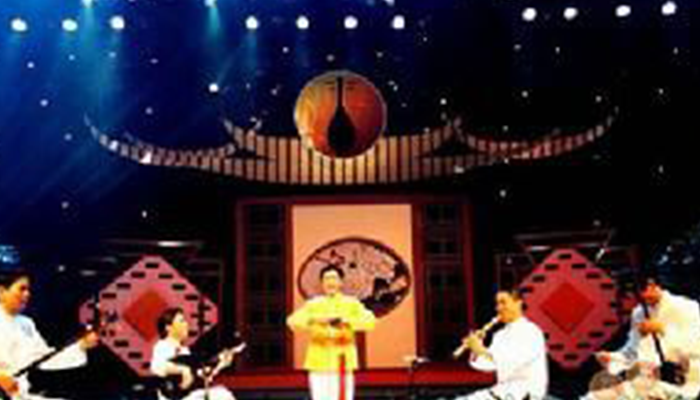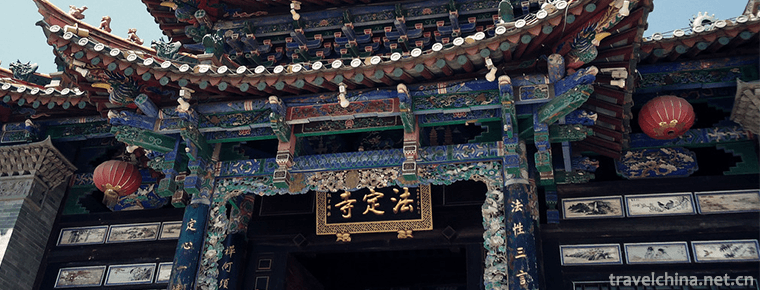2019-01-13

- By ChinaWiki.net
- Chinese Edition
- 2019-05-07
Brocade song
Brocade song, formerly known as Gezi or Shijin song, is also called begging tune. It was named Jinge in 1953. This is a form of singing accompanied by instrumental music. It is one of the traditional folk songs in southern Fujian Province. It is popular in the plain area of southern Fujian, including Xiamen, Jinjiang and Longxi, as well as in the Chinese settlements of Taiwan Province and Nanyang Islands.
According to local historical records, Jinge was formed on the basis of regional folk songs and ballads in Southern Fujian in Song and Yuan Dynasties. It absorbed the nutrients of opera, Southern Opera and Southern Ci. It was blended by folk artists and spread in the vast rural areas of Southern Fujian. In the old society, when the countryside was depressed, the peasants flowed into the city, and the brocade songs also flowed into the city. The brocade singers sold along the street like beggars, so some people said it was a "beggar song". After liberation, Jinge also gained new life. The singing style of brocade songs can be roughly divided into two schools: hall and pavilion. Tang school is mainly spread in the countryside. It has a rough and powerful singing voice, accepts folk songs, and is good at singing "miscellaneous tunes". Its melody is flexible and varied, with the end of each sentence. The Pavilion School is popular in the city. Its singing is elegant, meticulous and clear-cut. There are many tunes in Nanqu, and its instruments and fingering are close to Nanqu.
On May 20, 2006, the opera was approved by the State Council and listed in the first batch of national intangible cultural heritage list.
Historical origin
The brocade songs of the Tang and Song Dynasties were initially formed, and the Ming Dynasty had a relatively complete stereotype. It comes from the folk, sings in dialect, and has a strong local flavor. The melody is fluent and plain, expressive, popular and healthy, easy to learn and understand, and loved by the masses. Many rural areas have "Gezi Band" and "Gezi Hall". After Jin Ge entered the city, it changed to Nanpipa, Dongxiao, Sanxian, Erxian and other musical instruments. The singing tune changed from lively, rough and bold to graceful and gentle, and the posture was comfortable. The name of the tune plate was changed from "Seven-Character Zizi" to "Four Empty", "Major" to "Five Empty" and "Beth". In singing, sometimes a few stanzas of Nanyue are inserted, which is called "Quduan". Rural areas still retain their original style, gradually forming three schools: rural areas, towns and the original Yueqin. The "pavilions" in towns include eight music chants, music chanting pavilions, Jixian Pavilion, Shengyin Garden and Jinde Society; the "pavilions" in rural areas include Qingfeng Hall, Qingxian Hall, Dongyin Hall, Jinyun Hall, Yidetang and Panhe Hall; the "yueqin" school includes Changtai, Huaan, Pinghe and the walking singing (begging tune) of blind artists and the "four-pronged tune" of Yunxiao.
In the late Ming and early Qing Dynasties, Jinge settled in Taiwan along with the people of southern Fujian. Still circulating in Taiwan are "Niu Li Song", "Sick Side Song" and "Tianwuwu". The music of Taiwanese Gezi Opera is a combination of local folk music on the basis of brocade songs. At the same time, brocade songs were also popular among immigrants in various parts of the South China Sea. In the 18th year of the Republic of China (1929), Zhangzhou brocade artists Chen Lishui, Lin Ting, Lai Yaoshan, Wang Qingji, Chen Jiaozao, Zhuya, Zhong Qing and Chen Bu were invited to perform in various parts of the South China Ocean. They also made more than 40 albums in Singapore Hindenburg Baidai Company. They sang "Chen Sanmo Mirror", "Chen Sansan", "Ann Tong Nao", "Shadowless Song", "Money Gambling Song", "Uncle Song", "Return to Caries by the Otter??
In 1950, there were more than 10 Jinge Clubs in Zhangzhou. The more famous ones were Longan Ying Jinge Club, Xiaxun Jinge Club, Xinqiao Jinge Club, Dongyue Jinge Club and Punan Jinge Club. In 1952, the Jin Opera Society was established in Shima, Longxi County to perform the opera Peacock Flying Southeast. In 1956 and 1978, at the invitation of China Records Company and Hong Kong Oriental Records Company, we produced records and recorded cassette tapes for distribution at home and abroad. In the early 1960s, the cultural departments organized efforts to excavate and record 26 brocade classics and more than 150 tunes by 1963. Since the reform and opening up, many new plays have been created, such as "Missing My Family", "Seeking My Ancestor", "Narcissus Love", "Taiwanese Grandma Watching Women's Volleyball" and "Mr. Qiao Huizhangzhou". They have participated in provincial and national literary and artistic performances and won many awards. In 1983, the new singer Wang Suhua went to Singapore to perform. In the 1980s, various local brocade song societies gathered and observed many times, strengthened artistic exchanges, and the brocade song performing arts continued to improve.
Inheritance significance
The brocade song repertoire, which has a long story, is called "Big Column". Some of the excerpts are "small folds", and there are one or two hundred traditional songs. With the passage of time, people's interest in brocade songs has become increasingly indifferent. The art of brocade songs is facing a crisis of possible extinction at any time and needs to be protected.
Zhangzhou brocade song is rooted in the folk people. Its melody is graceful and smooth, its lyrics are easy to understand, and it has a strong local flavor. Jinge is one of the oldest folk songs in southern Fujian. When Zheng Chenggong recovered Taiwan in the late Ming and early Qing Dynasties, he brought it to Taiwan, and combined it with local folk songs and tunes to form a "songboy". Therefore, experts believe that Jinge is the "old ancestor" of Gezi Opera. The close relationship between brocade songs and Taiwanese Gezi Opera has made brocade songs a colorful link connecting the hearts of people across the Taiwan Strait. The brocade song is the crystallization of wisdom created by the working people (singing artists) according to their respective ethnic regional characteristics, historical and cultural traditions, the pursuit of aesthetic ideals of the masses and local customs, language characteristics. It has a distinct artistic personality.
The state attaches great importance to the protection of intangible cultural heritage. On May 20, 2006, the opera was approved by the State Council and listed in the first batch of national intangible cultural heritage list.

Ask a Question
Your email address will not be published.


0 Questions